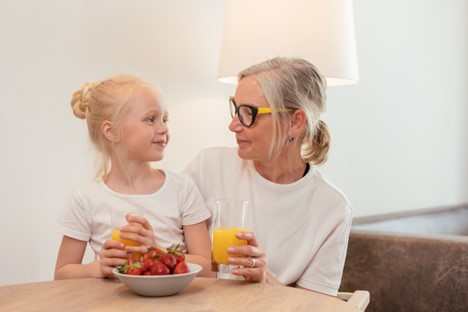How to Talk to Kids About a Dementia Diagnosis
Learning that a cherished elder has been diagnosed with dementia can be heart-wrenching for all involved. The nature of dementia makes it challenging to foresee the manner and timing of its impact on the person’s cognitive functions, memory, ability to communicate, and behavior.
Whether a grandparent, a close family friend, or a friendly senior next door has received a dementia diagnosis, family members of all ages will undoubtedly be affected. For older children and teens, explaining the stages and the brevity of the illness will be challenging but feasible. For younger children, navigating conversations about dementia may be a little more complicated.

When Should You Talk to Younger Children?
Children tend to pick up on shifts in the family dynamic, changes to their social environment and tensions among other household members. In instances of bad news or adverse events, for example, one psychology professor advises talking with children soon. Why? “When bad things happen, kids take their cues from their parents, and they look to us as models to help them gauge how they should process or cope with difficult information.”
Talking with younger children in the early stages of their loved one’s diagnosis awards them as much time as possible to process the information. It minimizes any distress they may feel from unknown family stressorswhile also allowing them to enjoy valuable time with the special senior.
In the early stages of a dementia diagnosis, it’s also advised that you or your loved ones connect with compassionate dementia care services to learn about options for the person living with the illness and support options for their caregivers.
Pick the Right Time
As with most difficult conversations, timing and location are key. Choose a time when it’s unlikely there will be disruptions and when there are no major events or activities planned following your talk.
Prepare the Facts and Be Transparent
While you won’t want to use heady medical terminology with younger children, having a grasp of core symptoms, stages and ‘what to expect’ is fundamental to a successful conversation.
Explain that the person they know and love are unwell and that they will begin to act differently: they may get confused, forget who others are, and they will need help looking after themselves — eating, showering and with other Activities of Daily Living; it’s okay to be scared, sad and confused.
Explaining the symptoms will allow young kids to understand their loved one’s illness better and will enable them to begin to process the diagnosis.
Let them know that the regular activities they do with their loved one will change in the coming months. If theycommonly met grandma at a local coffee shop on Saturday mornings (for example), future meets may occur at grandma’s home instead. Involving younger kids in the pivoting and planning in some form will allow them to feel valued and seen.
Be gentle but firm. There is currently no cure for dementia. This can be confusing and difficult to process for younger children. It’s essential not to give false hope.
Lastly, Leave the Conversation Open
Let children know there’s no right or wrong way to process a loved one’s illness, that all their feelings are valid, and that they can talk to you — at any time.
Dementia advances through a series of symptoms. Young children are especially likely to have questions and need reassurance as the illness progresses. Writing letters or notes can be especially helpful for children who struggle to articulate their emotions.
Takeaway
Hearing that a senior is living with dementia will send shockwaves through the oldest members to the youngest members of the family. By having a gentle (but frank) discussion, involving children in minor care details, and leaving room for ongoing conversation, you’re preparing your children as best you can to manage a challenging time.


